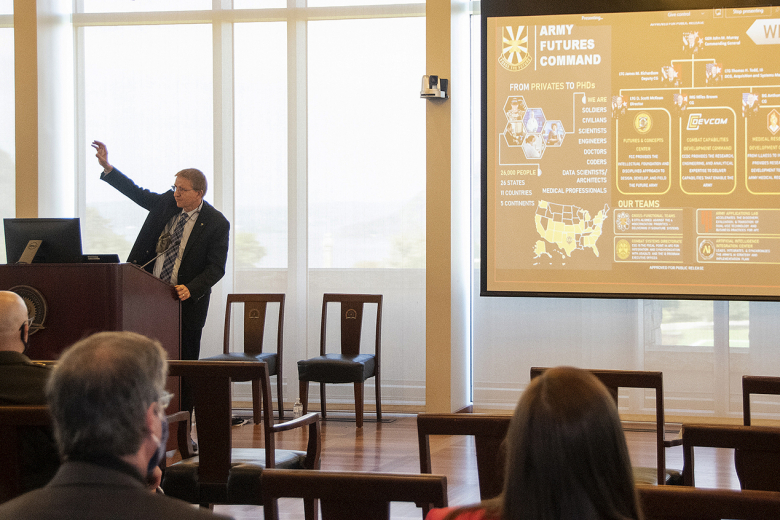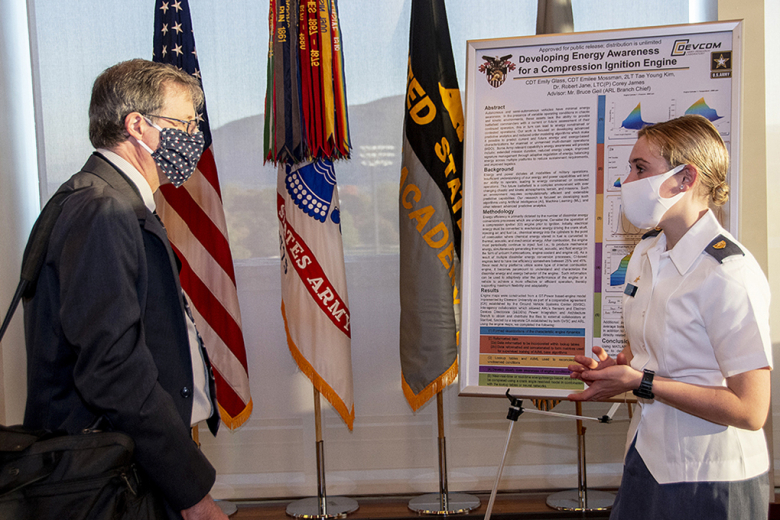West Point recently hosted nearly 200 contributors for a hybrid Army Research Laboratory-U.S. Military Academy Technical Symposium (AUTS). Scientists, faculty and cadets from across the two organizations shared their ongoing research efforts at the annual event meant to strengthen the 30-year-old partnership.
“At a time when readiness and modernization are deemed essential to winning our Army’s future wars, the bond between the U.S. Military Academy and the Army Research Laboratory could not be more important,” Col. Paul Goethals, Department of Math professor, said.
The relationship between ARL and USMA predates the founding of ARL in 1992. The AUTS meeting has been held nearly every year since, making this the 28th symposium.
The meeting originated as an opportunity for cadets who had performed summer internships with ARL to present their work to ARL technical experts.
This academic forum continues to showcase the exceptional research efforts at both USMA and ARL, and cadets remain an integral part of this experience. Cadets presented their work to a professional audience, received input to help strengthen their work, and saw first-hand how organizations can work closely to solve some of the world’s most challenging problems.
“I have attended about 10 AUTS meetings over the years and I am always impressed by the quality of the research performed by the cadets,” the ARL Associate Director for Technology Dr. Nick Fell said. “Sometimes it is hard to remember that they are not graduate students but are all undergraduates performing at a very high level. AUTS remains one of the highlights of my professional year.”
By highlighting new and ongoing research, the two organizations strengthened existing efforts and identified new collaboration opportunities. The 2021 AUTS featured 43 session presentations by ARL scientists, USMA faculty and USMA cadets. A testament to the diversity of this partnership, a total of nine USMA academic departments were represented throughout the conference.
Research is both technically complex and in line with the Army’s needs. Class of 2022 Cadet Dani Cross, Life Science major, presented her work entitled, “Synthesis of Organometallic chromophores.”
Her research team is creating compounds with a metallic center that have color changing characteristics.
Specifically, they are trying to modify these compounds to increase their Reverse Saturable Absorption characteristics, which means they can absorb more energy in their excited state after energy initially hits the atoms. This technology is like Transition lenses; however, in their research the reaction time must be much faster to be effective. The application of this technology is to shield optical devices from high energy sources, such as lasers.
ARL and USMA often share research goals, making collaboration between the organizations mutually beneficial. For example, Dr. Rebecca Coulson, a Davies fellow jointly appointed by ARL and the Department of Mathematics, presented her ongoing research on semantic descriptions of AI-generated battles. Her research uses data from the AI-simulated battles within AI for Command and Control of Multi Domain Operations and the Director’s Strategic Initiative. Various AI methods are being researched at ARL, and this work focuses on how to make the AI more useful for the end user, focusing on eventually outputting a textual description of the AI recommendations — ensuring that as Coulson said, “Actions are akin to words.”
Treating actions like words has the benefit of expanding the availability of tools within the field of natural language processing.
AUTS provides USMA cadets and faculty an opportunity to build relationships with ARL scientists that often lead to future research projects and collaboration. Cadets, for example, may pursue an ARL summer research internship and sometimes extend their work into yearlong capstone projects in their field of study.
“This partnership is a great example of the intellectual capital that West Point provides for the Army,” said Dean of the Academic Board, Brig. Gen. Shane Reeves. “Conducting undergraduate research with faculty, paired with strong partnerships like that with the Army Research Lab, is a core part of our cadets’ intellectual development.”
The impact of these symposiums extends beyond the potential application of their work. West Point’s developmental model through cadet research challenges our Army’s future leaders. Cadet researchers presented 24 projects, providing an enriching experience for 38 cadets. As Civil Engineering major and Applied Statistics minor, Class of 2023 Cadet Gregory Langone explained, “Presenting at AUTS pushed me to develop a stronger conceptual understanding of my project. I benefited from the practice of communicating complex ideas and presenting in a professional setting.”
U.S. History major and Space Science minor, Class of 2022 Cadet Ramsey Rouabhia, said, “The insight and curiosity of attendees helped me think about my project in ways I didn’t see before.”
This decades-long partnership can serve as a model for how to connect Army intellectual resources and elevate ongoing work to address the challenges of today and prepare for the challenges we will face in the future. Dr. Patrick Baker, the U.S. Army Combat Capabilities Development Commandʼs ARL director, said, “Building on this relationship between future Army leaders from USMA and Army science and technology is an underpinning opportunity as we move more deeply into the 21st century.”
“If you are interested in partnering with West Point, learn more about our Research Centers and Academic Research Division.”

